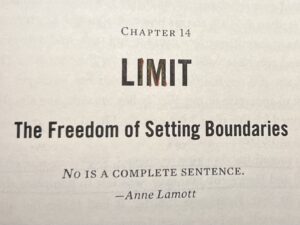
I caught up on some overdue reading over the holiday weekend and decided to wear my “Content Curator” hat today.
Everyone is talking about “Quiet Quitting” (QQ).
Per Wikipedia:
The philosophy of quiet quitting is not abruptly leaving a job but doing exactly what the job requires, no more no less.[2] The main objective of this mindset is avoiding occupational burnout and paying more attention to one’s mental health and personal well-being.[1] Proponents of quiet-quitting refer to it as acting your wage.*
This Business Insider article provides a cross-generational perspective on the topic and identifies the motivations of various employee populations who “quiet quit.”
For the what, I encourage you to read Chapter 14 of Greg McKeown’s Essentialism. (Read the whole book! I’m currently reading it a second time.)
Chapter 8, “The Freedom of Setting Boundaries,” provides a possible antidote to QQ.

McKeown wrote the book eight years before QQ became a Tik-Tok trend. But the topic is and will remain relevant, even when QQ fades from our collective memory.
Why?
The art of setting boundaries is, well, essential. At SDMS 360, we frame it as the skill of differentiating “Requirements from Preference-Traditions-Conveniences (PTCs also known as bias).” Identifying what is critical from what we prefer, what we’ve always done, and what’s easy to do.
Making decisions based on PTCs can result in a range of outcomes. The mundane: I should have worn a different outfit, selected fish instead of steak, or watched a comedy instead.” The consequential: outcomes that result in trauma, abuse, injustice, or global atrocities.
The skill of identifying and executing around requirements is:
- Timeless
- Necessary
- Universal
I invite you to check out these resources. I would love to hear your thoughts on both. Mine are in the Comments.
To learn how to incorporate a requirements-driven approach to managing diversity in your organization, check out our new online course, “Delivering on the Promise of Diversity.”
#quietquitting #essentialism #requirements #craft #capability #universal #bias #strategicdiversitymanagement #sdm #sdms360

